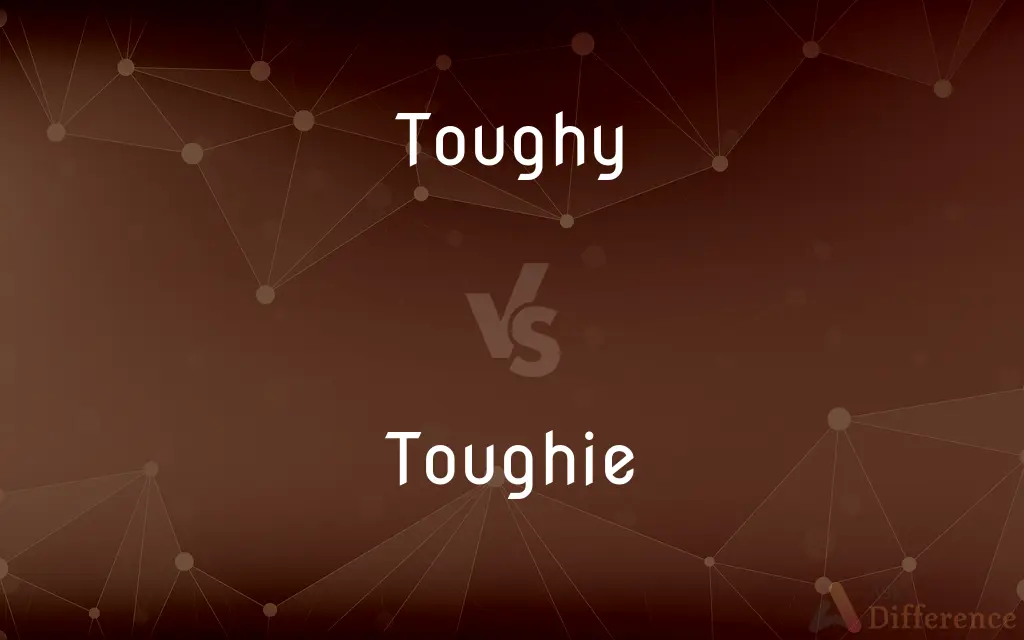Toughy vs. Toughie — What's the Difference?
By Maham Liaqat & Fiza Rafique — Updated on April 22, 2024
"Toughy" and "toughie" are both informal terms used to refer to a difficult question or problem, though "toughie" is more commonly used in this context.

Difference Between Toughy and Toughie
Table of Contents
ADVERTISEMENT
Key Differences
"Toughy" is an alternative spelling of "toughie," which is colloquially used to describe something that is hard to deal with or solve. While "toughie" is more frequently used and recognized in informal English, particularly in British English.
Both terms can be used interchangeably when referring to a problem or question that is difficult to answer. However, "toughie" is also often used to describe a tough person, particularly in a playful or endearing way.
The use of "toughy" might be less common, and some might consider it a less standard variant of "toughie." On the other hand, "toughie" appears more frequently in literature and spoken language, making it more familiar to a wider audience.
When it comes to pronunciation, both words are pronounced the same way, which underscores their shared meaning and use. However, the choice between them can depend on regional preferences or the familiarity of the audience with either term.
In writing, "toughie" may be preferred for clarity and recognition, especially in contexts outside of personal or informal communication. "Toughy," while understood, might be seen as a less conventional choice.
ADVERTISEMENT
Comparison Chart
Common Usage
Less common variant
More commonly used, especially in the UK
Definition
Difficult question or problem
Difficult question, problem, or a tough person
Recognition
Less recognized
Widely recognized and used
Context of Use
Informal, less standard
Informal, widely accepted
Additional Meaning
Primarily refers to questions or problems
Can also refer playfully to tough people
Compare with Definitions
Toughy
Less commonly used variant of "toughie."
We had a toughy at the quiz last night.
Toughie
Playfully describes resilience or toughness.
My little brother is a toughie; he never cries.
Toughy
Occasionally used to describe a tough situation.
Negotiating with him is always a toughy.
Toughie
Appears in puzzles or quiz contexts.
This crossword has some real toughies.
Toughy
Informal term for a difficult question or problem.
That math problem was a real toughy.
Toughie
Commonly used in both spoken and written English.
That was a toughie, but we managed to solve it.
Toughy
Rarely used in reference to tough individuals.
He's a toughy when it comes to negotiations.
Toughie
A difficult or problematic question.
The final question on the test was a toughie.
Toughy
Found in casual conversations or informal writings.
This puzzle is a toughy; can you help?
Toughie
Informally refers to a tough person.
She’s a real toughie on the basketball court.
Toughy
Alternative form of toughie
Toughie
A person who is tough and determined
She was a toughie on the phone
Toughie
A difficult problem or question
Who do you admire most? That's a toughie
Toughie
A thug; a tough.
Toughie
A difficult problem.
Toughie
(informal) Something that is tough, or difficult.
His question is a toughie. I might have to do some more research.
Toughie
Someone or something that is strong and resilient.
Toughie
A tough; Someone or something that acts as a thug or bully.
Toughie
An aggressive and violent young criminal
Toughie
A particularly difficult or baffling question or problem
Common Curiosities
What does "toughy" mean?
"Toughy" is an informal term for a difficult question or problem.
Can "toughie" refer to a person?
Yes, "toughie" can informally refer to a person who is tough or resilient.
Is "toughie" the same as "toughy"?
Yes, "toughie" is essentially the same as "toughy" but is more commonly used.
Which is more common, "toughy" or "toughie"?
"Toughie" is more common and widely recognized, especially in informal English.
Are "toughy" and "toughie" used internationally?
"Toughie" is used more internationally, particularly in English-speaking countries, while "toughy" might be less recognized.
Is "toughie" considered slang?
"Toughie" is considered informal or colloquial language rather than slang.
Can "toughy" be used in formal writing?
It is better to avoid "toughy" in formal writing due to its informal nature and less standard usage.
What contexts are suitable for using "toughy" or "toughie"?
Both are suitable for informal contexts, especially when discussing difficult questions or problems.
How should I decide whether to use "toughy" or "toughie"?
Choose "toughie" for wider recognition and clarity, especially in written or formal contexts.
Do dictionaries recognize both "toughy" and "toughie"?
Most dictionaries recognize "toughie," while "toughy" may appear less frequently.
Share Your Discovery

Previous Comparison
Faired vs. Fared
Next Comparison
Observe vs. WatchAuthor Spotlight
Written by
Maham LiaqatCo-written by
Fiza RafiqueFiza Rafique is a skilled content writer at AskDifference.com, where she meticulously refines and enhances written pieces. Drawing from her vast editorial expertise, Fiza ensures clarity, accuracy, and precision in every article. Passionate about language, she continually seeks to elevate the quality of content for readers worldwide.














































